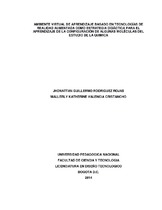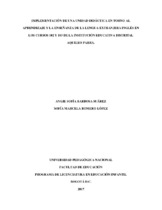Mostrar el registro sencillo del ítem
AGENTE DE SOFTWARE Q Y EL APRENDIZAJE DE MODELOS CONCEPTUALES
| dc.contributor.author | Maldonado Granados, Luis Facundo | spa |
| dc.contributor.author | Ortega del Castillo, Nerey | spa |
| dc.contributor.author | Ibáñez Ibáñez, Jaime | spa |
| dc.contributor.author | Sanabria Rodríguez, Luis Bayardo | spa |
| dc.contributor.author | Quintero Suárez, Victor Julio | spa |
| dc.date.accessioned | 2021-08-02T16:53:39Z | |
| dc.date.available | 2021-08-02T16:53:39Z | |
| dc.date.issued | 2003-07-01 | |
| dc.identifier | https://revistas.pedagogica.edu.co/index.php/TED/article/view/5922 | |
| dc.identifier | 10.17227/ted.num14-5922 | |
| dc.identifier.issn | 2323-0126 | |
| dc.identifier.issn | 2665-3184 | |
| dc.identifier.uri | http://hdl.handle.net/20.500.12209/15731 | |
| dc.description | We submit results of a research project focused on the relationship between a cardarrangement exercise and the learning of conceptual models, built based on hierarchicalontologies. This approach is more frequent in measurement of attitudes - hot cognition, as it isexpressed by Brown (1987) - or in opinion or subjectivity studies (Brown, 1980), and it isknown as Q Methodology. A software agent - Q Agent - was programmed to be used either ina hypertext environment or as a companion to study press document and it’s effects onlearning are explored. Two main comparisons are conducted: between use and non use of QAgent, and between Q Agent with hypertext and Q Agent with pressed documents. Thepredictive value of student scores with the Q Agent in relation with student scores on acognitive competence test is assessed as well. Three trials were carried on with a ninth gradestudent sample. Data are analyzed by means of ANOVA and multiple regression models.Significant effects of using the Q Agent were found, and scores on the Q Agent Game aresignificant predictors of scores on the cognitive competence test. Learning performance usingQ Agent in hypertext environments drift lightly to be superior in relation to Q Agent withpressed documents. Results are discussed in the framework of information controlledautonomous learning systems, and the meaningful learning. | es-ES |
| dc.format.mimetype | application/pdf | spa |
| dc.language.iso | spa | |
| dc.publisher | Editorial Universidad Pedagógica Nacional | spa |
| dc.relation | https://revistas.pedagogica.edu.co/index.php/TED/article/view/5922/4904 | |
| dc.rights.uri | https://creativecommons.org/licenses/by-nc/4.0 | |
| dc.source | Tecné, Episteme y Didaxis: TED; Núm. 14 (2003) | spa |
| dc.source | Tecné, Episteme y Didaxis: TED; No. 14 (2003) | spa |
| dc.source | Tecné, Episteme y Didaxis: TED; n. 14 (2003) | spa |
| dc.subject | Ambientes de aprendizaje | spa |
| dc.subject | Agentes de software | spa |
| dc.subject | Ontologías | spa |
| dc.subject | Metodología Q | spa |
| dc.subject | Aprendizaje de conceptos | spa |
| dc.subject | Aprendizaje de modelos conceptuales | spa |
| dc.subject | Aprendizaje autónomo | spa |
| dc.subject | Software educativo | spa |
| dc.title | AGENTE DE SOFTWARE Q Y EL APRENDIZAJE DE MODELOS CONCEPTUALES | spa |
| dc.rights.accessrights | info:eu-repo/semantics/openAccess | |
| dc.rights.accessrights | http://purl.org/coar/access_right/c_abf2 | |
| dc.type.local | Artículo de revista | spa |
| dc.type.coar | http://purl.org/coar/resource_type/c_6501 | eng |
| dc.type.driver | info:eu-repo/semantics/article | eng |
| dc.type.version | info:eu-repo/semantics/publishedVersion | |
| dc.rights.creativecommons | Attribution-NonCommercial 4.0 International |
Ficheros en el ítem
| Ficheros | Tamaño | Formato | Ver |
|---|---|---|---|
|
No hay ficheros asociados a este ítem. |
|||
Este ítem aparece en la(s) siguiente(s) colección(ones)
-
TED: Tecné, Episteme y Didaxis [1388]
Pone a discusión artículos originales de la comunidad de educadores e investigadores nacionales e internacionales en Educación en Ciencias Experimentales, Matemáticas y Tecnología, presentando los diversos avances en estos campos de conocimiento.



